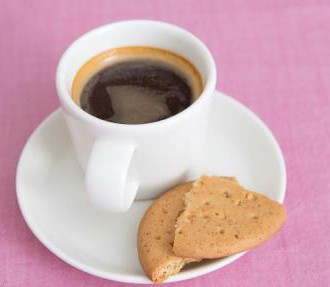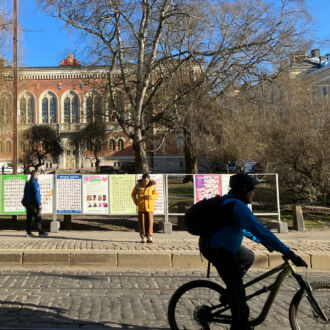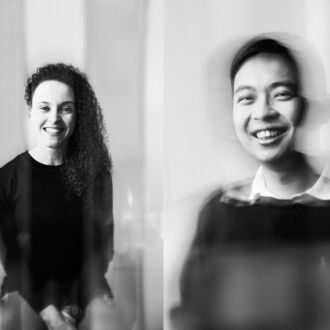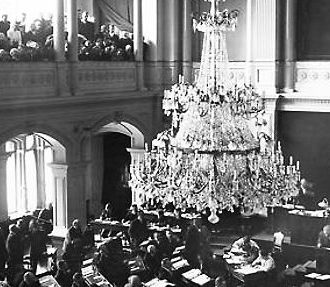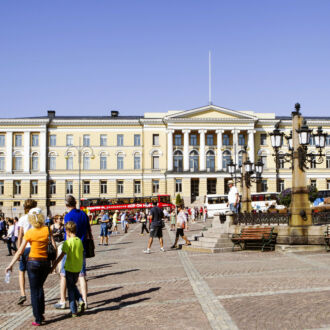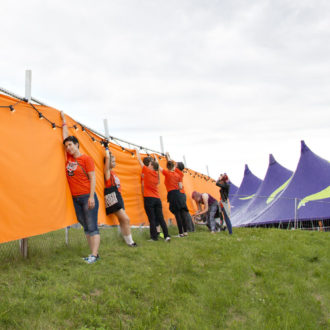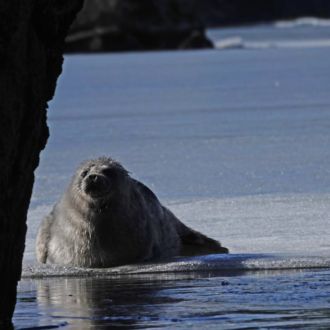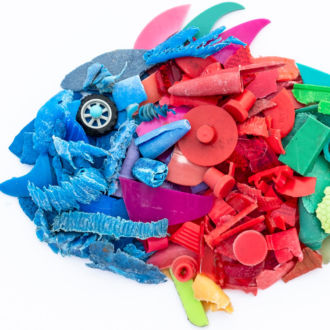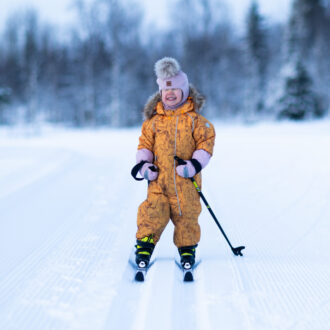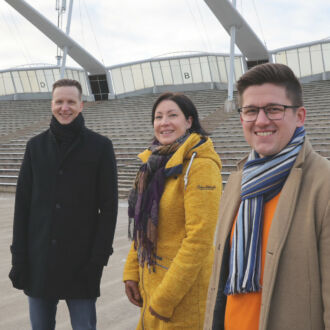Finland generally has strong voter participation; it’s no exaggeration to say that many people consider it a civic duty. The first round of the 2024 presidential election, for example, drew 75 percent voter participation (77.3 percent among women and 72.5 for men).
One unofficial aspect of elections doesn’t show up in the statistics, although you could argue that it contributes to voter turnout. To mimic a phrase that has become well known in political campaigning, “It’s the coffee, stupid.”
Combine elections with Finland’s robust coffee-drinking culture and you have the longstanding Finnish tradition of election day coffee. After doing your part by voting, it’s time to stop at a nearby café or a friend’s place for a cup of coffee and perhaps a pastry. If your polling station is in a school building, kids and parents may be operating a popup café to raise money for a class trip.
A coffee-worthy occasion
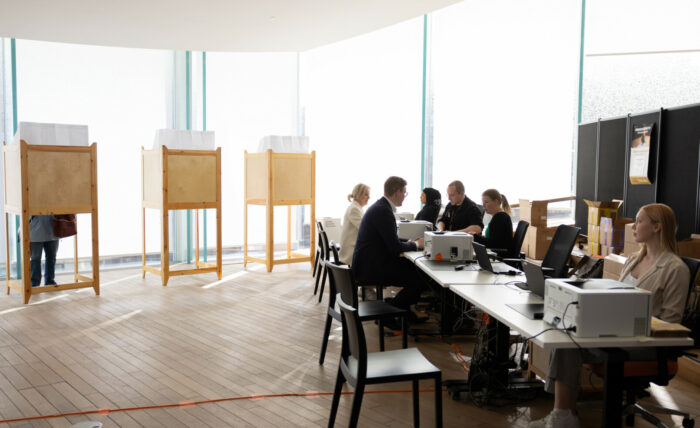
Showing your ID and going into a booth to cast your vote is a small but momentous action.Photo: Emilia Kangasluoma
People in Finland drink the most coffee per capita of any country in the world, consuming more than 12 kilograms (26.5 pounds) annually, according to the International Coffee Association.
However, drinking coffee is not just about the quantity. Whether it’s a coffee break with your colleagues or the symbolic recognition of a significant milestone such as casting your vote, it’s often associated with a social occasion, a feeling of togetherness.
During a recent nationwide election, we ventured out into Helsinki to engage people in conversation about the Finnish phenomenon – yes, phenomenon – of election day coffee. Along the way, we consumed a great deal of caffeine and enjoyed surprisingly wide-ranging discussions about coffee’s place in Finnish hearts, culture and election day traditions.
Voting and coffee go together
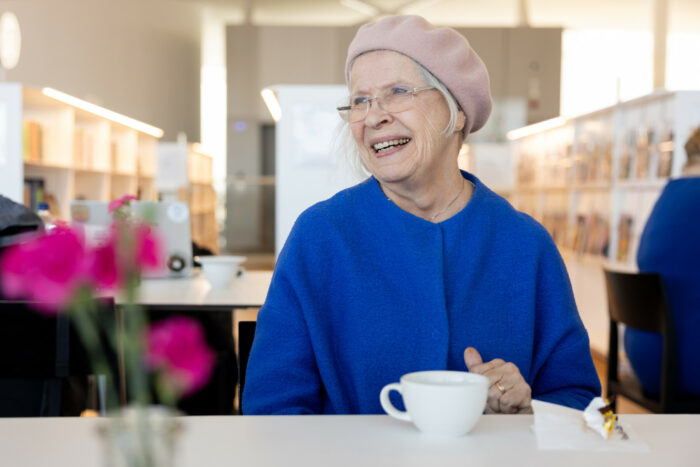
Ann-Helen has a voting history that extends back to the 1960s, and she has gone for coffee after almost every vote she has cast.Photo: Emilia Kangasluoma
Ann-Helen has just cast her ballot at an advance voting location in Oodi, Helsinki’s central library, an architectural and cultural landmark popular with Helsinkians and tourists alike. She is a retired psychologist and psychoanalyst, and has a voting history that extends back to the 1960s.
She sits down with a cup of black coffee at Oodi’s third-floor café, where we have a view of the silvery hull of the Kiasma Museum of Contemporary Art, the stately stone pillars of Parliament and the all-glass façade of the Music Centre.
For Ann-Helen, as for many people in Finland, voting and coffee go together. She usually chooses a savoury snack to go with her election day coffee, rather than a sweet desert.
“After the previous presidential election I didn’t go for coffee, and it felt wrong somehow,” she says. “Apart from that time, I’ve always gone for coffee.” She has been a widow for some years now, she tells us. “It was nicer to go together, but I still go – here I am.”
Deciding who to vote for was easy, Ann-Helen says. “I had two candidates in mind, and I thought it over on my way here.” This is the second time she has made use of the option to vote early. “Just to make sure that nothing keeps me from voting,” she says.
How does it feel to have voted? “It’s a satisfying feeling.” With advance voting under way and election Sunday approaching, she says, “When you run into people you know, you always have to ask them, ‘Have you voted yet?’”
Getting fancy
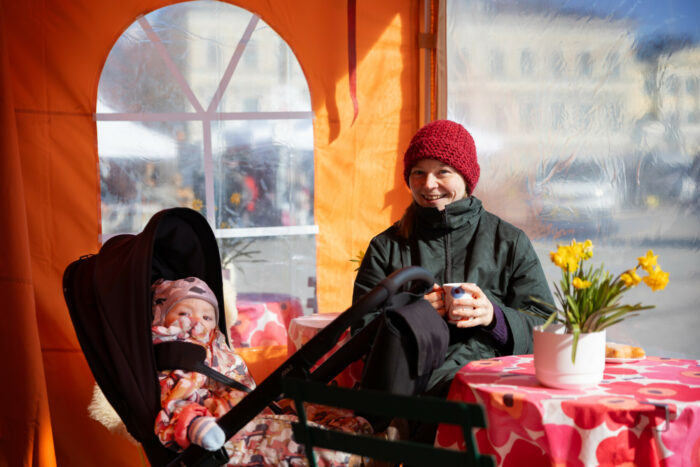
Tähti is starting an election day coffee tradition for her family.Photo: Emilia Kangasluoma
On a sunny but brisk spring day, Tähti walks to a seaside café on Market Square after casting her vote at Helsinki City Hall. A chilly breeze is blowing, but a tent-like pavilion keeps patrons, servers and journalists cosy.
One-year-old Nietos looks on from his stroller while his mother savours a cup of coffee and a jam-filled pastry. She breaks off a piece of it for him to chew on.
Tähti is a cellist and a music teacher. She and her family are living in Helsinki for a year while her partner completes his student teaching for his pedagogical studies. After that, they plan to return to the central western city of Tampere.
“It was nice to vote at City Hall because I’d never been inside before,” she says. “Voting there felt fancier than going to the local library, which is where I’ve usually voted.”
She doesn’t come from a family that emphasises election day coffee, but she has decided to adopt the custom. “I know it goes from one generation to the next,” she says. “Now that I have a one-year-old, it’s a good time to start. It’s the first time he has come with me to vote. I can create a tradition for our family.”
More important than ever
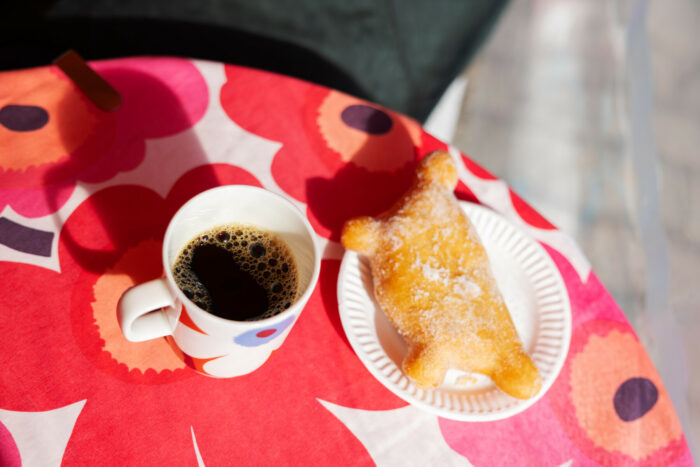
This pastry only vaguely resembles the animal from which it gets its name: possu, or “pig.”Photo: Emilia Kangasluoma
Tähti is attracted to the idea because the ritual of going for coffee “makes casting your vote feel a bit more ceremonious.” It’s funny how coffee and pastries can encourage people to get to the polls.
“Voting seems more important than ever,” says Tähti. “Back when I was studying, I might have thought that one vote couldn’t matter. But for many years now, I’ve voted in every single election.”
She continues, “With the unusual world situation, you really start to see you can’t necessarily assume that democracy is permanent. When I was younger, maybe I took that for granted.”
Nietos is still chomping away at his piece of dough, craning his neck to see the chirping birds that are hopping around searching for crumbs.
“Having a child also changes the way you think,” Tähti says.
Coffee among friends
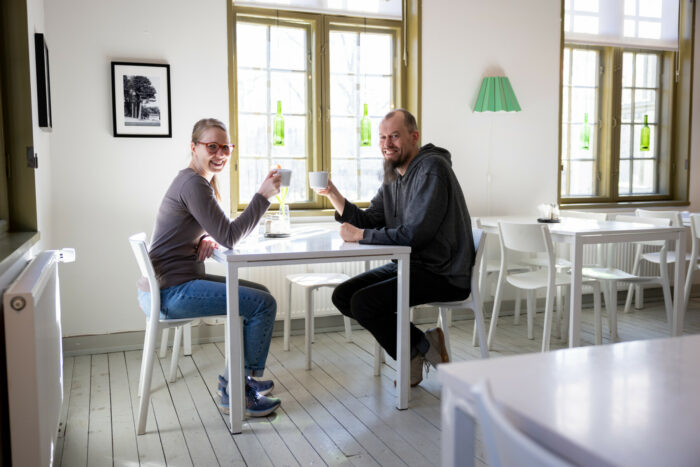
For Saana (left) and Vesa, election day coffee is a way to celebrate voting and encourage others to go, as well. Photo: Emilia Kangasluoma
We meet Saana and Vesa at Café Monami, located in a venerable manor house on the eastern outskirts of the Finnish capital. Both are longtime Helsinki residents but grew up more than 400 kilometres (250 miles) north of Helsinki, near Kaustinen, the home of a large annual folk music festival.
Music became a part of their lives: Saana is a freelance musician, and Vesa, an all-around tech worker, sometimes moonlights as a concert sound technician.
As they make progress on large slices of dangerously delectable cake, they talk about what election day was like in the small towns where they grew up.
As a child, Vesa often accompanied his parents and relatives to the polling station. “There was something exciting about it,” he says. “It was so official.” Coffee was served afterwards.
“I remember noticing how important voting was for people, particularly older people,” says Vesa. Many would put on their best clothes to go to the polling station, and some people still do.
“It was a dignified, earnest occasion,” says Saana. “And then you celebrated by going for coffee. Finnish people have such a strong coffee culture anyway. There’s always a daily coffee break. But on election day, it’s more festive and stately.”
She’s not sure if her father used to have coffee after voting, because he always went in the evening, just before the polling place closed. “That was his tradition,” she says. “He always said that somebody had to go that late, so the election officials wouldn’t feel like they sat there all evening for nothing.”
Talking about talkoot
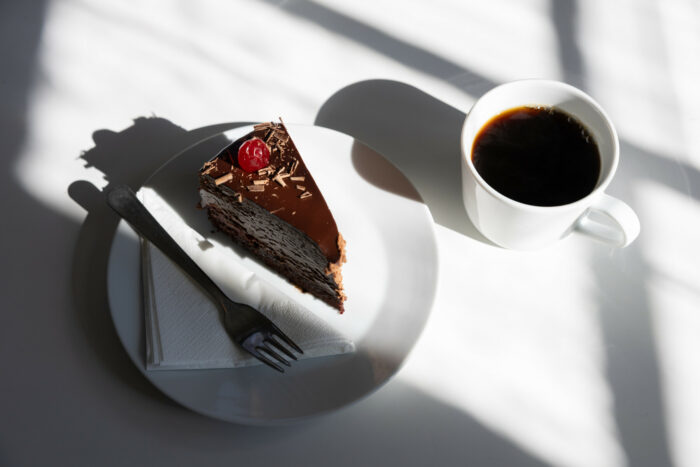
We believe you will agree that there is something sweet about the tradition of election day coffee.Photo: Emilia Kangasluoma
While voting itself is an individual act, it’s also part of a collective effort, of course.
“I always vote,” says Vesa. “It’s nice to keep up the tradition, and it’s important to society, too.”
Saana thinks that it’s self-evident. “You don’t lose anything by voting,” she says. “Why wouldn’t I vote?”
Vesa believes that your attitude about voting, whether negative or positive, will rub off on those around you. “It seems like election day coffee is part of encouraging others to vote,” he says. “It’s a way of expressing, ‘I voted. You go and vote, too.’”
In other words, coffee – and don’t forget about pastries – gives people a tasty excuse to make a big deal out of voting. He theorises that it may be more fun to post a mouthwatering election day coffee photo on social media than just a message saying “I voted!”
On a symbolic level, the visible, sociable tradition of election day coffee makes it clear that voting — and governing — is a shared effort, regardless of which party you choose. (The ballot typically includes a dozen or more parties. Usually, eight to ten of them have enough support to win seats in Parliament.)
The discussion brings to mind the Finnish word talkoot, meaning an event where people get together to chip in and accomplish a large job. Working towards a common goal increases the feeling of community.
Perhaps unsurprisingly, talkoot always includes a coffee break, too.
Voting in Finland
Free and fair elections, covered by a free and independent press, form a cornerstone of democracy.
All eligible voters are automatically registered to vote (the voting age is 18). They receive notification digitally or via regular mail in advance of each election, including the address of their local polling place for election day, as well as a list of locations for advance voting.
Some parents bring their kids with them to the polling place to get them interested, hoping the tradition will carry over to the next generation.
The whole voting process takes a few minutes. You show your ID, they check your name off the list, and you receive a folded card. You go into a booth and write the number of your candidate inside the card. Then they stamp the front of the card and you place it into a slot in a sealed box.
More info about elections in Finland here.
By Peter Marten, April 2025
